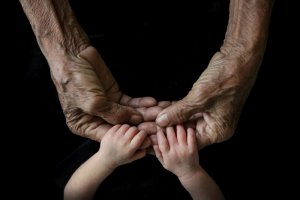Greeting to the 20th International
Attachment Conference 2021
Trauma and Attachment between
Generations
Inherited wounds and resilience in therapy, counseling, and prevention
New and impressive research has demonstrated the effects of traumatic experiences, and the grave consequences that these experiences have on childhood development and on the entire maturation process even into the fourth subsequent generation.
The traumatic experiences that a pregnant woman may have can negatively “mark” the development of the fetus and infant. Stressful experiences during pregnancy can leave negative traces not only in the mother, but in her children as well. Epigenetic research has demonstrated that, depending on environmental conditions, a person’s genes may be either permanently switched on or off. This is the mechanism by which experiences made in the environment can influence genetic activity, and whether and in what dose hormones or messenger substances are formed in the brain. Trauma experienced by the father-to-be may also play a big role. There is evidence that epigenetic changes in the male’s genetic material can be passed on.
Traumatic environmental and relational experiences may mark children as a result of epigenetic processes, particularly during the first three years of their development. The effects may be seen in brain maturation, the ability to regulate stress, and immune system response, among others. The effects on these children may be “inherited” and manifest again in later generations in the form of susceptibility to infection, anxiety, difficulties in affect regulation, and in relational disorders. This may happen even if the persons in question did not themselves experience trauma.
Even after extreme traumatic experiences, some people may develop hardly any or no long-term symptoms. They exhibit a certain psychological resilience. It is important to understand the factors that contribute to such resilience, and to ask how resilience might be fostered in both the individual and in society as a whole. What kind of therapy or counseling is best suited for making use of our understanding of the transmission of traumatic experience to subsequent generations? How might new experiences in the therapeutic relationship contribute to the development of resilience in patients? When should timely prevention measures be initiated? What should measures look like that would allow a patient to leave behind a “traumatic inheritance” so that it no longer affects their behavior? These questions are of especially pressing social and individual importance given the traumas resulting from past and present wars and from environmental and other dislocations and catastrophes!
Internationally renowned researchers and clinicians will examine topics relating to these questions, and will report on their research and experience, and discuss potential preventive measures.
The conference is aimed at everyone who is actively involved in counseling and therapy, medicine, psychology, psychotherapy, pedagogy, social work, policy development, or in courts that see families, couples, children, adolescents, and adults who have experienced trauma. It is also designed to encourage those involved in fostering resilience and prevention so that they may help to overcome the consequences of traumatic experiences, and to ensure that they do not develop in the first place.
Karl Heinz Brisch




